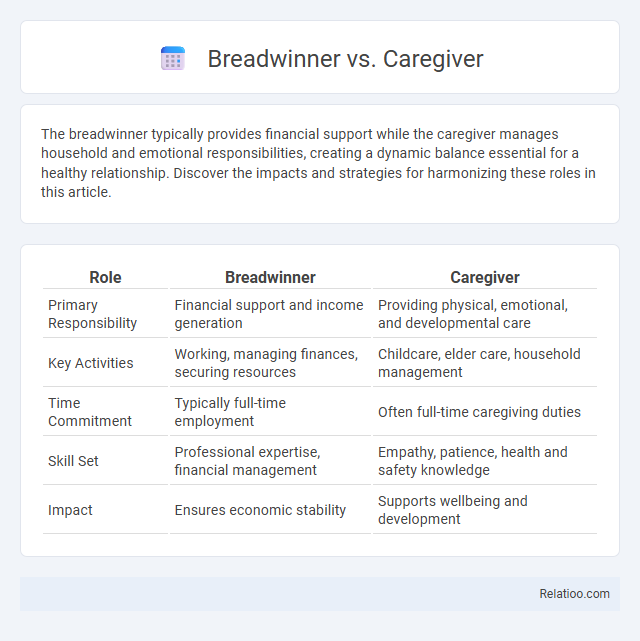The breadwinner typically provides financial support while the caregiver manages household and emotional responsibilities, creating a dynamic balance essential for a healthy relationship. Discover the impacts and strategies for harmonizing these roles in this article.
Table of Comparison
| Role | Breadwinner | Caregiver |
|---|---|---|
| Primary Responsibility | Financial support and income generation | Providing physical, emotional, and developmental care |
| Key Activities | Working, managing finances, securing resources | Childcare, elder care, household management |
| Time Commitment | Typically full-time employment | Often full-time caregiving duties |
| Skill Set | Professional expertise, financial management | Empathy, patience, health and safety knowledge |
| Impact | Ensures economic stability | Supports wellbeing and development |
Understanding the Breadwinner vs Caregiver Dynamic
The Breadwinner vs Caregiver dynamic highlights the contrasting roles often assumed within households, where the breadwinner primarily provides financial support and the caregiver focuses on nurturing and managing domestic responsibilities. This dynamic shapes family interactions, influences stress distribution, and impacts relationship satisfaction by defining individual contributions to the household. Understanding these roles promotes empathy, improves communication, and supports a more balanced partnership in managing both economic and emotional needs.
Historical Perspectives on Gender Roles
Historical perspectives on gender roles highlight the breadwinner as traditionally male, responsible for financial support, while the caregiver, often female, managed home and child-rearing duties. These roles were reinforced by societal norms and labor division, limiting women's economic participation and men's involvement in domestic life. Understanding these distinctions helps you recognize the evolving dynamics in contemporary gender roles and family responsibilities.
Economic Implications of Breadwinner and Caregiver Roles
The economic implications of breadwinner and caregiver roles are significant, with breadwinners typically generating primary household income through employment, directly influencing family financial stability and access to resources. Caregivers, often providing unpaid labor such as childrearing and eldercare, contribute to household well-being but may face income loss or limited career advancement due to reduced workforce participation. Balancing these roles affects gender wage gaps, social security benefits, and overall economic inequality within families and society.
Societal Expectations and Cultural Influences
Societal expectations often place the breadwinner role as a primary marker of success, emphasizing financial responsibility and career achievement, while the caregiver role is culturally associated with nurturing and domestic duties. Your experience navigating these roles can be shaped by cultural norms that define gender-specific responsibilities, influencing how each role is valued and perceived in different communities. Understanding these dynamics helps in addressing the pressures and biases surrounding breadwinners and caregivers, fostering a more equitable recognition of both contributions.
Shifting Trends in Modern Households
Shifting trends in modern households reveal a growing balance between breadwinner and caregiver roles, reflecting changing societal norms and economic demands. Women increasingly participate as breadwinners, while men take on more caregiving responsibilities, challenging traditional gender roles. Your family's dynamic can benefit from understanding these evolving roles to create a more equitable and supportive home environment.
Emotional Impact on Breadwinners and Caregivers
Breadwinners often experience high levels of stress and pressure due to financial responsibilities, leading to anxiety and sometimes feelings of inadequacy when unable to meet expectations. Caregivers face emotional exhaustion and compassion fatigue from constant caregiving demands, which can result in depression and social isolation. The dual role of breadwinner-caregiver intensifies emotional strain by combining financial stress with caregiving burdens, increasing the risk of burnout and reduced overall well-being.
Balancing Career Ambitions and Family Needs
Balancing career ambitions and family needs requires understanding the distinct roles of breadwinner and caregiver and fostering mutual support between partners. Effective communication and flexible work arrangements help breadwinners pursue professional goals without compromising caregiving responsibilities. Prioritizing shared values and equitable division of household tasks promotes harmony and well-being for the entire family.
Challenges Faced by Non-Traditional Families
Non-traditional families often face unique challenges as breadwinners and caregivers navigate overlapping roles that defy conventional gender norms. Economic pressures can intensify when caregivers assume primary financial responsibilities, causing stress due to limited social support and workplace inflexibility. Legal and societal recognition disparities exacerbate these issues, impacting access to benefits and community resources essential for family stability.
Policy and Workplace Support for Caregivers
Policy and workplace support for caregivers often lags behind the recognition granted to breadwinners, leading to inadequate accommodations such as paid family leave and flexible working hours. Organizations that implement caregiver-friendly policies report higher employee retention and productivity due to reduced stress and absenteeism among employees balancing work and caregiving responsibilities. Expanding legislative measures, including tax credits and subsidized caregiving services, is critical to equitably support individuals in caregiver roles and close the gap between breadwinner and caregiver workplace treatment.
Redefining Success: Towards Equitable Partnerships
Redefining success in relationships involves shifting from traditional roles of breadwinner and caregiver toward equitable partnerships where responsibilities are balanced based on individual strengths rather than gender norms. Studies show that couples who share domestic and financial roles report higher satisfaction and improved emotional well-being. Emphasizing mutual support and flexibility fosters healthier dynamics and challenges outdated societal expectations, promoting equality and shared purpose.

Infographic: Breadwinner vs Caregiver
 relatioo.com
relatioo.com